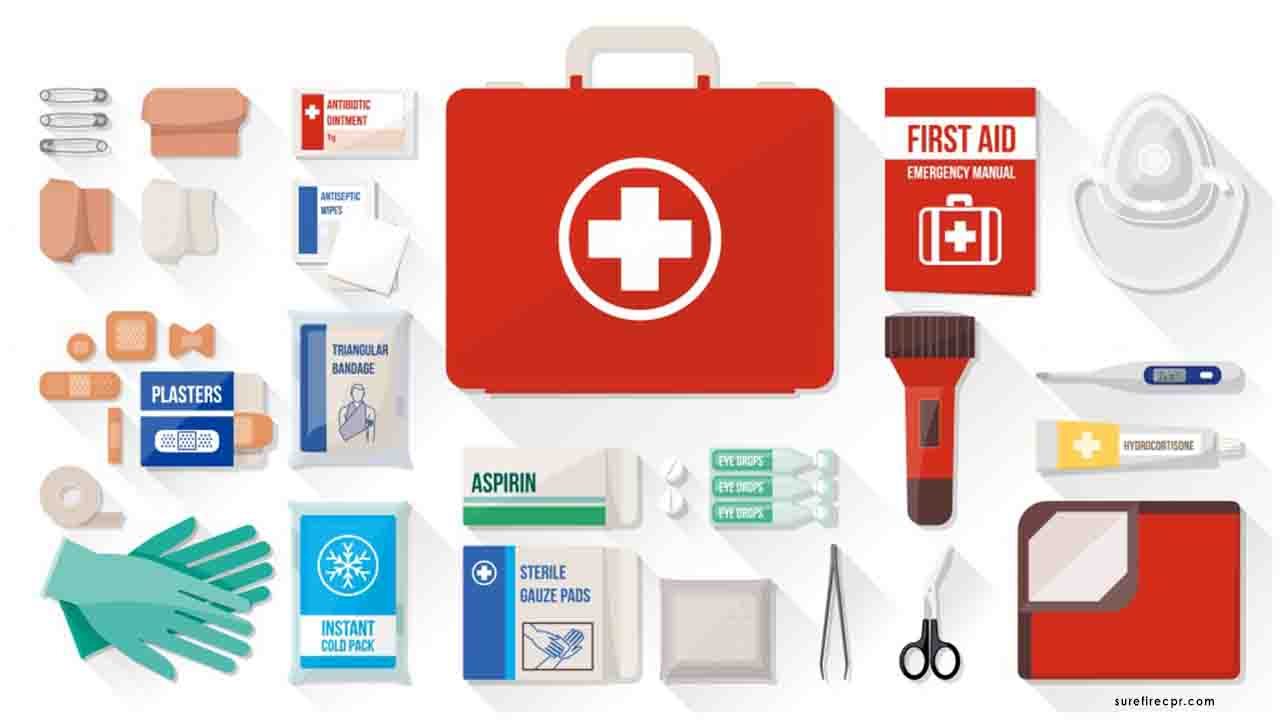First aid is important for a number of situations that don’t require a trip to the hospital or emergency room. A well-stocked first-aid kit can help you respond effectively to common injuries and emergencies. These situations include minor falls, bee stings, burns, allergic reactions, and other common accidents. A first aid kit is helpful for these types of situations.
Keep at least one first-aid kit in your home and one in your car. Store your kits someplace easy to get to and out of the reach of young children. Make sure children old enough to understand the purpose of the kits and know where they're stored. A well-stocked first-aid kit provides you with the supplies you need to be ready for most minor emergencies.
Putting a first aid kit together is as simple as placing some basic items in a small container that you can keep with you at home. You can also keep one in your car or carry one with you when you’re out of the house or on a vacation. Store the container in the medicine cabinet or in your kitchen in your home to keep it away from young children.
A kit can be large or small. It can contain every possible thing you might need. Or it can contain a few basics. Consider what you need for you, your family, and your lifestyle.
Basic supply items could include:
- Adhesive tape
- Elastic wrap bandages
- Bandage strips and "butterfly" bandages in assorted sizes
- Superglue
- Rubber tourniquet or 16 French catheter
- Nonstick sterile bandages and roller gauze in assorted sizes
- Eyeshield or pad
- Masks
- Large triangular bandage (may be used as a sling)
- Aluminum finger splint
- Instant cold packs
- Cotton balls and cotton-tipped swabs
- Disposable non-latex examination gloves, several pairs
- Duct tape
- Petroleum jelly or other lubricant
- Plastic bags, assorted sizes
- Safety pins in assorted sizes
- Scissors and tweezers
- Hand sanitizer
- Antibiotic ointment
- Antiseptic solution and towelettes
- Eyewash solution
- Thermometer
- Turkey baster or other bulb suction device for flushing wounds
- Sterile saline for irrigation, flushing
- Breathing barrier (surgical mask)
- Syringe, medicine cup or spoon
- First-aid manual
- Hydrogen peroxide to disinfect
Medications that a First aid kit should have:
- Aloe Vera gel
- Calamine lotion
- Anti-diarrhea medication
- Laxative
- Antacids
- Antihistamine, such as diphenhydramine
- Hydrocortisone cream
- Cough and cold medications
- Personal medications that don't need refrigeration
- Auto-injector of epinephrine, if prescribed by your doctor
- Pain relievers, such as acetaminophen (Tylenol, others), ibuprofen (Advil, Motrin IB, others)
- Consider keeping aspirin in your first-aid kit, as well. Aspirin may be life-saving in an adult with chest pain. If you or someone else has new or unexplained chest pain or maybe having a heart attack, call for emergency medical help immediately. Then chew a regular-strength aspirin. However, don't take aspirin if you are allergic to aspirin, have bleeding problems or take another blood-thinning medication, or if your doctor previously told you not to do so.
-
Never give aspirin to children.
Emergency items that everyone should be aware of, be it, adults or kids:
- Emergency phone numbers, including contact information for your family doctor and pediatrician, local emergency services, emergency road service providers.
- Medical consent forms for each family member
- Medical history forms for each family member
- Small, waterproof flashlight or headlamp and extra batteries
- Waterproof matches
- Small notepad and waterproof writing instrument
- Emergency space blanket
- Cell phone with solar charger
- Sunscreen
- Insect repellant
Give your kit a checkup
- Check your First-aid kit from time to time and especially before you are going on a vacation or riding in your car.
- Check your first-aid kits regularly to be sure the flashlight batteries work and to replace supplies that have expired or been used up.
- Consider taking a first-aid course through your local chapter for information on classes.
- Prepare children for medical emergencies in age-appropriate ways.
-
Check for the expiration dates of medicines and lotions and discard them. Do not forget to replace it with fresh stock.
- Make sure no lotion or liquid bottle is leaking, as it might damage the other contents of the box.

 A well-stocked first-aid kit can help you respond effectively to common injuries and emergencies.
A well-stocked first-aid kit can help you respond effectively to common injuries and emergencies.









.jpeg)



.jpg)





.jpeg)



.jpg)


.jpg)




.jpg)


